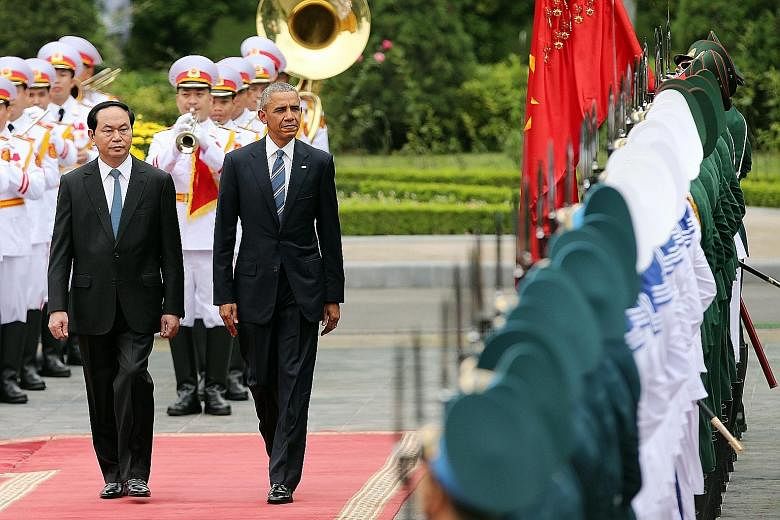The United States is ending a Cold War-era ban on sales of lethal weapons to Vietnam, US President Barack Obama announced in Hanoi, in a significant warming of relations between the once-bitter enemies.
"The US is fully lifting the ban on the sale of military equipment to Vietnam that has been in place for some 50 years," he said at a joint press conference with Vietnamese President Tran Dai Quang yesterday.
In thanking Washington, Mr Quang said the lifting of the ban "is clear proof that both countries have completely normalised relations".
The US leader's three-day trip to Vietnam, before heading to Japan to attend a Group of Seven summit, is part of his administration's strategic "rebalance" to Asia.
At the press conference, Mr Obama also said disputes in the South China Sea should be resolved peacefully and not by whoever "throws their weight around". But he maintained that the embargo move was not related to China.
"The decision to lift the ban was not based on China or any other considerations. It's based on our desire to complete what has been a lengthy process of moving towards normalisation with Vietnam."
He added that arms sales would be considered on a case-by-case basis and would depend on Vietnam's commitments on human rights.
It will be a while before Hanoi can get any US weapons. Under US law, the State Department can propose arms sales but it must be approved by Congress, said Ms Phuong Nguyen, an associate fellow at the Washington-based Centre for Strategic and International Studies.
Still, the US move reflected the "Obama administration's calculus that Vietnam is to be courted as a strategic, serious US partner in South-east Asia", she added.
The US-Vietnam relationship has warmed across the board in recent years. Vietnam is now the largest Asean trade partner of the US. It has also signed up to the US-led Trans- Pacific Partnership trade pact.
On the sidelines of Mr Obama's visit - which will also take him to Ho Chi Minh City, formerly named Saigon, where US involvement in the South-east Asian country ended ignominiously in April 1975 - private airline Vietjet Aviation signed a US$11.3 billion (S$15.6 billion) deal to buy 100 Boeing planes.
Vietnam has a long and often fraught history with China, and tensions between the neighbours have risen over maritime disputes in the South China Sea.
In Beijing, a Foreign Ministry spokesman would say only that the arms sales embargo was a product of the Cold War and that China was happy to see the US and Vietnam "develop normal cooperative relations".
SEE TOP OF THE NEWS

